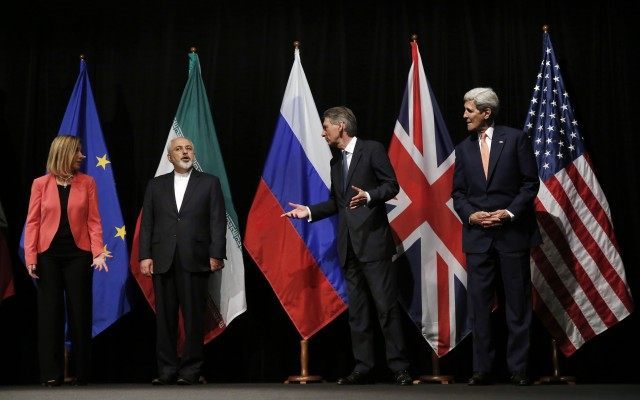While some Arabic speakers applauded Iran’s nuclear deal with America on Twitter, there are some who blasted the country for negotiating with the United States at all. Saudi Arabia, a natural enemy of Iran, is also displeased about the deal, specifically the release of sanctions.
Translation: Iran opened its legs for the Great Satan. Consolations.
https://twitter.com/fobia_1/status/620983692425433093
Many feel this way despite the fact that Iran managed to get Western officials to accept minor monitoring of facilities and only an eight-year limit on uranium enrichment. The agreement also allows Iran to keep up to 300kg of enriched uranium.
Translation: “Great Satan” on Iranian television. Yesterday’s enemy, ally today.
"الشيطان الأكبر" على شاشات قناة إيران الرسمية بعد #الاتفاق_النووي
عدو الامس (ايران)حليف اليوم pic.twitter.com/SOnrh2oDB2
— حمد الشامسي (@ALshamsi789) July 14, 2015
Translation: Are we going to change alliances in the Middle East? Yesterday’s enemy! Today’s Friends!
#الاتفاق_النووي هل نحن بصدد تغيير التحالفات في الشرق الاوسط ؟ تحالف امريكي ايراني ضد تحالف خليجي روسي !! اعداء الأمس اصدقاء اليوم
— نايف العتيبي (@n_otaby) July 14, 2015
Translation: Agreement with the Great Satan. Devils agreed to soil the Muslims.
اتفاق الشيطان الأكبر
مع الشيطان الأنجس
اتفق الشياطين على المسلمين .
— _سراج الطائي هنا (@ALhashed99) July 14, 2015
Saudi Arabia and Iran have maintained a tense relationship due to the differences of their Islamic faith. A nuclear armed Iran poses much danger to America’s biggest ally in the Middle East. One Saudi official warned that a nuclear Iran could “wreck havoc on the region.”
Translation: It seems to me the world wants to solve the Iran problem at the expense of Saudi Arabia and Sunnis.
#الاتفاق_النووي
.
.
.
يبدو لي ان العالم يريد حل المسألة الايرانية على حساب المملكة العربية السعودية واهل السنة بالشام— بــنـــدر المطيـــري (@balmotere) July 14, 2015
Shi’ites make up about 90 percent of the population in Iran. Saudi Arabia is a “Wahhabi” Sunni Muslim country.
Translation: I think Saudi Arabia should gain a nuclear weapon. Balance of power in the region.
https://twitter.com/GmailTherar9/status/620943606648451072
Translation: Should the kingdom of Saudi Arabia consider the establishment of a nuclear program. They have the right to possess nuclear reactors to deter enemies.
يجب على المملكة العربية السعودية أن تفكر بجدية في إنشاء البرنامج النووي ، ويحق لها أن تمتلك مفاعلات نووية لردع الأعداء #الاتفاق_النووي
— aznounallal (@AznounAllal) July 14, 2015
But it is not necessarily a nuclear armed Iran that worries Saudi Arabia. As usual, oil is the top concern. The deal eliminates sanctions against Iran, which means Saudi Arabia could potentially lose their monopoly on the lucrative natural resource.
“Even with a historic deal, oil from Iran will take time to return, and will not be before next year, most likely the second half of 2016,” explained Amrita Sen, the chief oil analyst at Energy Aspects. “But given how oversupplied the market is with Saudi output at record highs, the mere prospect of new oil will be bearish for sentiment.”

COMMENTS
Please let us know if you're having issues with commenting.